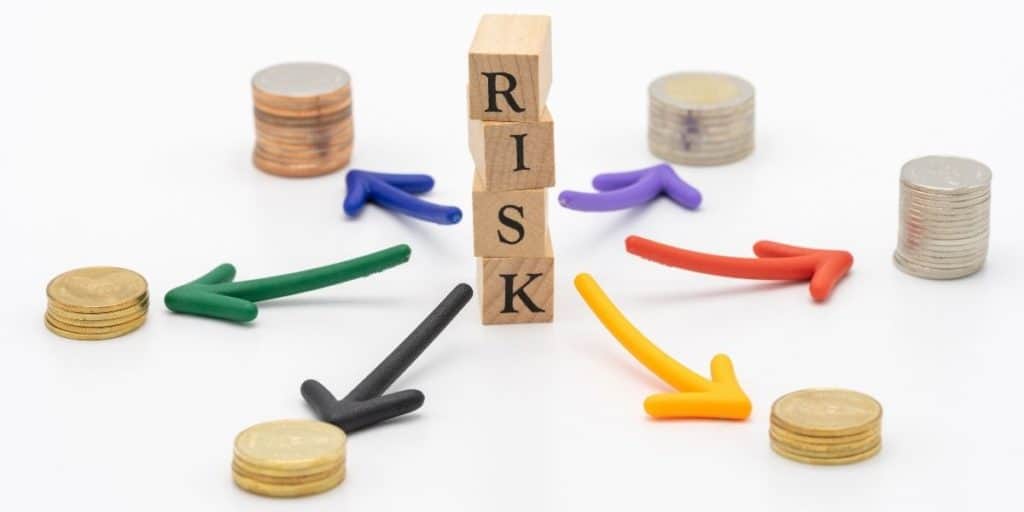When it comes to index fund investment, there are so many options available that it is often difficult to make the best choice. With frequently changing inflation rates, different percent returns on investment, and the general volatility of the market, how do you know you’ll make money from your investment in an index fund? And how do index funds compare to inflation?
Index funds can keep up with, and even beat, inflation. It is important to invest in strong index funds and trust that the market will continue to grow, despite any short term negative market trends. Diversification of your investments is also important to ensure “real” growth.
Understanding investments and their relationship to inflation can be incredibly complex. Read on as I attempt to decipher this puzzle for you and to learn more about inflation, index funds, and their relationship.
IMPORTANT SIDENOTE: I surveyed 1500+ traders to understand how social trading impacted their trading outcomes. The results shocked my belief system! Read my latest article: ‘Exploring Social Trading: Community, Profit, and Collaboration’ for my in-depth findings through the data collected from this survey!
Table of Contents
What Is Inflation?
As the economy grows, individuals often make more money or are in better positions to spend the money they already have. This means that demand increases for various goods, increasing the cost of production and driving up the price. It also means that as the cost of goods goes up, at a higher rate that their wage increases. Therefore, people have less ability to purchase goods or “buying power.”
Inflation is the measure of the buying power of the average dollar. For example, one may have been able to buy a gallon of milk for $3 in the past but may now cost them $4. The depreciation of the dollar or the fact that you now need $4 instead of $3 to buy the same good, is measured by inflation.

Typically, the inflation rates vary between 2% and 4% annually. Most frequently, the average inflation rate is about 3%. This means that, after about a year, a good that used to sell for $1.00 would now sell for about $1.03. Though this may seem like a relatively small change, this has a huge effect on the global financial systems every year.
What Is an Index Fund?
When investing in the stock market, or even in the bond market, there is always room for loss. Even though making well-researched investments can often be a way to incur a higher return than keeping money in a bank, some people have lost hundreds of thousands of dollars in the stock market after making risky investments. So how does one eliminate risk when investing? Ultimately, you can’t — but you can make sure to invest in low-risk diversified investments, such as index funds.
An index fund is a form of investment that, rather than investing a lot in one stock, invests a smaller amount in a number of different stocks with the objective of replicating the returns of a targeted index. They are relatively low-risk investments as they are highly diversified.
While index funds may not grow as quickly as some individual stocks, index funds are great because as long as the fund in which you invest is in a growing section of the market, you are likely to yield some return.
On average, index funds grow at about 10% annually. This means that if you were to invest $100 at the beginning of the year, you would likely get a return of about $10 at the end of the year, making your total $110.
Index fund growth does vary from year to year, however. While some years it may grow at a rate higher than 10%, other years it will grow at a rate lower than 10%. That being said, in the long term, after a decent amount of time being invested, most investments in index funds average at about 10% growth.
Investing Helps You Beat Inflation
The end goal of investing is to try and not only make a positive return but also to make sure that your “buying power” after the investment term is greater than your original investment.
Continuing with our milk example, if you invest $3, the price of one gallon of milk at the time of investment, that when you cash in your investment, you would want to have enough money to buy more than just one gallon of milk, even if the price of milk has risen to $4.
This also means you want your annual return on investment to be higher than the growing inflation rate. This is often easier said than done, however.
CDs, for example, often do not grow at a rate higher than the rate of inflation, meaning that the purchasing power of your investment will fall over the time your money is invested.
Fortunately, many index funds grow at a rate quicker than the rate at which inflation rises. This means that index funds can be a safe bet at ensuring that the purchasing power of your investment is stronger when you eventually cash in on your investment.
However, before rushing to purchase index funds, it is important you do your research and to ensure that your investment is positioned to grow.
Here are some of the best US-based index funds to invest in:
- Any Index Fund Tracking the S&P 500: Between 1926 and 2017, the S&P 500 grew at an average rate of 10.22%. While maybe not the quickest earner, index funds tracking the S&P 500 are proven to be fairly reliable for beating inflation.
- Vanguard Real Estate ETF: This index fund, focused heavily on real estate, tracks the MSCI US Investable Market Real Estate 25/50 Index, a tracker of the US Real Estate Market. While it is subject to changes in the housing market, it definitely has some great potential.
- Fidelity U.S. Sustainability Index Fund: For those focused on socially responsible investing, this is a must. The fund tracks companies with above-average environmental, social, and governance (ESG) ratings.
Diversifying Your Assets Is Recommended
The best way to ensure your investments are relatively safe and are likely to overcome inflation is by ensuring to diversify your portfolio. That means make sure that your holdings span a number of different stocks in a number of different sectors.
While placing $10,000 in a company like Tesla may sound like it will create a great return, if Tesla were to suddenly go bankrupt or their price was to fall dramatically, it could bring serious harm to your investment portfolio.
Index funds, by their very nature, offer a degree of diversity in the fact that you are investing in a large, broad number of companies. Yet, you can still run the risk of not having enough diversity in your portfolio if any of your funds overlap.
For example, if you invest heavily in 2 or 3 index funds that track the S&P 500, while you may have some diversity, it will not be nearly as much as you may think.
The more diversity you achieve in your portfolio, the less risk you face if one company, or even one sector, collapses. It is incredibly important you consider diversifying when you invest, even when investing in index funds.
Author’s Recommendations: Top Trading and Investment Resources To Consider
Before concluding this article, I wanted to share few trading and investment resources that I have vetted, with the help of 50+ consistently profitable traders, for you. I am confident that you will greatly benefit in your trading journey by considering one or more of these resources.
- Roadmap to Becoming a Consistently Profitable Trader: I surveyed 5000+ traders (and interviewed 50+ profitable traders) to create the best possible step by step trading guide for you. Read my article: ‘7 Proven Steps To Profitable Trading’ to learn about my findings from surveying 5000+ traders, and to learn how these learnings can be leveraged to your advantage.
- Best Broker For Trading Success: I reviewed 15+ brokers and discussed my findings with 50+ consistently profitable traders. Post all that assessment, the best all round broker that our collective minds picked was M1 Finance. If you are looking to open a brokerage account, choose M1 Finance. You just cannot go wrong with it! Click Here To Sign Up for M1 Finance Today!
- Best Trading Courses You Can Take For Free (or at extremely low cost): I reviewed 30+ trading courses to recommend you the best resource, and found Trading Strategies in Emerging Markets Specialization on Coursera to beat every other course on the market. Plus, if you complete this course within 7 days, it will cost you nothing and will be absolutely free! Click Here To Sign Up Today! (If you don’t find this course valuable, you can cancel anytime within the 7 days trial period and pay nothing.)
- Best Passive Investment Platform For Exponential (Potentially) Returns: By enabling passive investments into a Bitcoin ETF, Acorns gives you the best opportunity to make exponential returns on your passive investments. Plus, Acorns is currently offering a $15 bonus for simply singing up to their platform – so that is one opportunity you don’t want to miss! (assuming you are interested in this platform). Click Here To Get $15 Bonus By Signing Up For Acorns Today! (It will take you less than 5 mins to sign up, and it is totally worth it.)

Conclusion
Many investors have found success in investing in index funds and have been able to keep up with, if not beat, inflation. While it is possible to lose money, just like with any other investment, index funds are a relatively safe option that has managed to grow quicker than inflation.
With any investment, it is important to do research before making your investment. Additionally, if you are not a well versed investor, I highly encourage you to speak with a certified financial planner before investing.
BEFORE YOU GO: Don’t forget to check out my latest article – ‘Exploring Social Trading: Community, Profit, and Collaboration’. I surveyed 1500+ traders to identify the impact social trading can have on your trading performance, and shared all my findings in this article. No matter where you are in your trading journey today, I am confident that you will find this article helpful!
Affiliate Disclosure: We participate in several affiliate programs and may be compensated if you make a purchase using our referral link, at no additional cost to you. You can, however, trust the integrity of our recommendation. Affiliate programs exist even for products that we are not recommending. We only choose to recommend you the products that we actually believe in.
Recent Posts
Exploring Social Trading: Community, Profit, and Collaboration
Have you ever wondered about the potential of social trading? Well, that curiosity led me on a fascinating journey of surveying over 1500 traders. The aim? To understand if being part of a trading...
Ah, wine investment! A tantalizing topic that piques the curiosity of many. A complex, yet alluring world where passions and profits intertwine. But, is it a good idea? In this article, we'll uncork...
